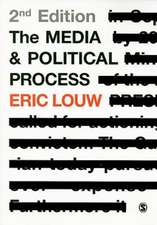Managing Intercultural Conflict Effectively: Communicating Effectively in Multicultural Contexts, cartea 5
Autor Stella Ting-Toomey, John G. Oetzelen Limba Engleză Paperback – 20 aug 2001
Preț: 609.75 lei
Preț vechi: 717.35 lei
-15% Nou
Puncte Express: 915
Preț estimativ în valută:
116.67€ • 121.83$ • 96.35£
116.67€ • 121.83$ • 96.35£
Carte tipărită la comandă
Livrare economică 15-29 aprilie
Preluare comenzi: 021 569.72.76
Specificații
ISBN-13: 9780803948433
ISBN-10: 0803948433
Pagini: 248
Ilustrații: 1, black & white illustrations
Dimensiuni: 152 x 229 x 13 mm
Greutate: 0.35 kg
Ediția:2.
Editura: SAGE Publications
Colecția Sage Publications, Inc
Seria Communicating Effectively in Multicultural Contexts
Locul publicării:Thousand Oaks, United States
ISBN-10: 0803948433
Pagini: 248
Ilustrații: 1, black & white illustrations
Dimensiuni: 152 x 229 x 13 mm
Greutate: 0.35 kg
Ediția:2.
Editura: SAGE Publications
Colecția Sage Publications, Inc
Seria Communicating Effectively in Multicultural Contexts
Locul publicării:Thousand Oaks, United States
Recenzii
"The authors of this book bring intercultural research and theory together and develop a practical framework for understanding intercultural conflict, leading to some very specific suggestions for how we can deal with it more effectively. Whereas most literature in this area focuses on a specific context, e.g. within the family, within business organizations, or within small groups, this book spans all these contexts. This book is written for people who are involved in intimate relationships, group-work, and manager- employee relationships —in other words, everyone can benefit."
Cuprins
About the Authors
List of Figures & Tables
Preface
1. Intercultural Conflict. An Introduction
Practical Reasons
Culture: A Learned Meaning System
Intercultural Conflict: Basic Assumptions
2. Intercultural Conflict. A Culture-Based Situational Model
A Culture-Based Situational Conflict Model: Primary Orientation Factors
Situational and Relationship Boundary Features
Intercultural Conflict Communication: Process Factors
Intercultural Conflict Competence: Four Criteria
Conclusion
3. Intercultural-Intimate Conflict in Personal Relationships
Intercultural -Intimate Conflict: Primary Factors
Intercultural -Intimate Conflict: Situational Features
Intercultural -Intimate Conflict: Process Factors
Intercultural -Intimate Conflict: Outcome Dimensions
Intercultural -Intimate Conflict: Practical Guidelines
4. Intercultural Conflict in Diverse Work Groups
What is a Group?
Sources of Conflict in a Culturally Diverse Group
Culture-Based Situational Features: Influence of Group Inputs on Conflict Process
Combined Situational and Process Factors: Influence of Conflict Process on Group Outputs
Intercultural Conflict in Diverse Work Groups: Practical Guidelines
5. Intercultural Conflict Between Managers and Employees in Organizations
Conflicts Between Managers and Employees
Primary Orientation Factors: A Model of Conflict Approaches
Conflicts in Multinational Organizations
Culturally Diverse Organizations in the United States
Intercultural Conflict Between Managers and Employees: Practical Guidelines
6. Managing Intercultural Conflict Competently
Knowledge Dimension
Mindfulness Dimension
Constructive Conflict Skills Dimension
Conclusions
Appendix: Measures of Face Concerns and Facework Behaviors in Four National Cultures
Data Collection Procedures
Results of Panculture Factor Analyses
References
Index
List of Figures & Tables
Preface
1. Intercultural Conflict. An Introduction
Practical Reasons
Culture: A Learned Meaning System
Intercultural Conflict: Basic Assumptions
2. Intercultural Conflict. A Culture-Based Situational Model
A Culture-Based Situational Conflict Model: Primary Orientation Factors
Situational and Relationship Boundary Features
Intercultural Conflict Communication: Process Factors
Intercultural Conflict Competence: Four Criteria
Conclusion
3. Intercultural-Intimate Conflict in Personal Relationships
Intercultural -Intimate Conflict: Primary Factors
Intercultural -Intimate Conflict: Situational Features
Intercultural -Intimate Conflict: Process Factors
Intercultural -Intimate Conflict: Outcome Dimensions
Intercultural -Intimate Conflict: Practical Guidelines
4. Intercultural Conflict in Diverse Work Groups
What is a Group?
Sources of Conflict in a Culturally Diverse Group
Culture-Based Situational Features: Influence of Group Inputs on Conflict Process
Combined Situational and Process Factors: Influence of Conflict Process on Group Outputs
Intercultural Conflict in Diverse Work Groups: Practical Guidelines
5. Intercultural Conflict Between Managers and Employees in Organizations
Conflicts Between Managers and Employees
Primary Orientation Factors: A Model of Conflict Approaches
Conflicts in Multinational Organizations
Culturally Diverse Organizations in the United States
Intercultural Conflict Between Managers and Employees: Practical Guidelines
6. Managing Intercultural Conflict Competently
Knowledge Dimension
Mindfulness Dimension
Constructive Conflict Skills Dimension
Conclusions
Appendix: Measures of Face Concerns and Facework Behaviors in Four National Cultures
Data Collection Procedures
Results of Panculture Factor Analyses
References
Index
Notă biografică
Stella Ting-Toomey (PhD, University of Washington) is a professor of human communication at California State University, Fullerton (CSUF). She has published numerous books and over more than 100 articles/chapters on the topics of intercultural conflict competence and ethnic identity negotiation process. A recent book title is Understanding Intercultural Communication, Second Edition (with Leeva Chung; Oxford University Press). Her publications have also appeared in the International Journal of Intercultural Relations, Communication Monographs, Human Communication Research, and The International Journal of Conflict Management, among others. Dr. Ting-Toomey¿s teaching passions include intercultural conflict theory and practice and intercultural communication training. She is the 2008 recipient of the 23-campus wide CSU Wang Family Excellence Award, and the 2007¿2008 recipient of the CSU-Fullerton Outstanding Professor Award. She has lectured widely throughout the United States, Asia, and Europe on the theme of mindful intercultural conflict competence.
Descriere
In this volume, Ting-Toomey and Oetzel accomplish two objectives: to explain the culture-based situational conflict model, including the relationship among conflict, ethnicity, and culture; and, second, integrate theory and practice in the discussion of interpersonal conflict in culture, ethnic, and gender contexts. While the book is theoretically directed, it is also a down-to-earth practical book that contains ample examples, conflict dialogues, and critical incidents. Managing Intercultural Conflict Effectively helps to illustrate the complexity of intercultural conflict interactions and readers will gain a broad yet integrative perspective in assessing intercultural conflict situations. The book is a multidisciplinary text that draws from the research work of a variety of disciplines such as cross-cultural psychology, social psychology, sociology, marital and family studies, international management, and communication.













